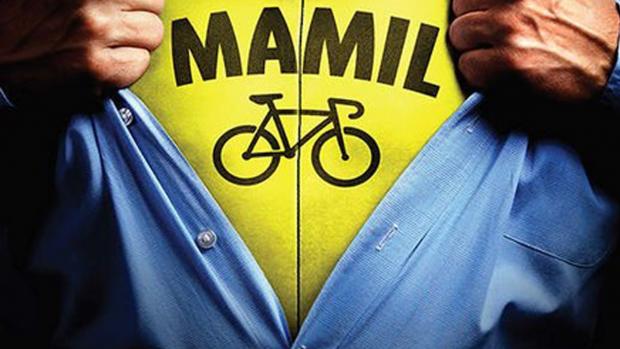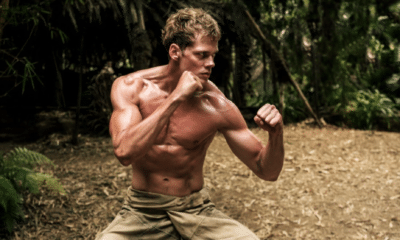Mamil review: A sports documentary with a personal touch—in MAMIL, Bird and Sharp chase a glance at the endearing people beneath the lycra in this helter-skelter tour de humans.
Mamil review by Abi Silverthorne.

Mamil review
In the wake of the recent success and Academy Award win (Best Documentary Feature) of Bryan Fogel’s 2017 sports documentary Icarus, now more than ever seems a particularly politic time to release a film that can boast any similarity or attraction to a like-minded cinema audience.
In this sense, Mamil (Middle-aged Men in Lycra) should prove a smash hit with fans of high-speed bicycle racing or sport features in general; its every frame imbued with details not only on the technicalities of the sport but of the lifestyles of those who partake in it, the expenses, the roadside injuries, the blogging. The bike scene is at times given over to the thrilling Cinema of Excess treatment with a look at the INTER BIKE convention and the extortionate prices of top of the range equipment that the Men in Lycra fork out and subsequently hide from their partners incessantly.
Meanwhile beautifully rendered, slow motion, high-octane shots of the bikers shooting around a bend in the road, elbow-to wing mirror with nearing cars, can trick you into thinking this will play out like a Scott Foil advert — all shine and no gravel.
This is fortunately not the case. Mamil —the documentary— is similar to its titular sub-society: it is not exclusive to the sporting elite, and, like all the best features, understands that it is less the actual races than the people taking part that matters.
The various characters (and I say characters—the filmmakers have found some truly extraordinary people) appear early on simply as wonderful bursts of colour and life, a caricature patchwork, as the exposition on sport cycling is initially relayed. But viewers are in for a treat as MAMIL delves deeper into their stories and all the stories of the various middle-aged men involved.
Less of a narrative with a pointed direction than a scenic route; the film oscillates focus through the run-time, changing gears rapidly from Australia, where Jim Turner and the fatboys ride together in a close brotherhood that utilises biking as a means to rediscover their health, self-identity and autonomy, all the way to New York— visiting Bob Nelson and his partner Jim Revak who ride in Manhattan wearing ‘atrociously loud’ Jerseys in an attempt to bring older gay men together to socialise in the Fast’n’Fab cycling team.
In LA, Carlos Morales hosts ‘partyrides’ alongside the Eastside to tackle obesity in the area after he received a terminal indictment of his weight form a doctor. In Minneapolis, Tim Turnquist organises a spiritual group full of all from Wikkens to Christians that always ‘start every ride with a prayer’. In London, a cycle vigilante Lewis Dediare tapes lorry horns to his handlebars and honks at cars that try to bump him off the road, while married-couple the Whilleys, following Mr. Whilley’s paralysing bike accident, go around town on a tandem bike, her up front, he up back hand-cycling.
Every Mamil selected to represent the global phenomena possesses that magical screen charisma, each of them unforgettable, and every one almost too kooky to have conjured up in anything other than a Taika Waititi screenplay, let alone reality.
lf— a film of today that reminds us, in these divisive times, how easily the simplest of things, and the most niche of interests, can bring us back into communities once more.
Neither does it shy from a touch of nuance. It’s as much a testament to the issues in modern masculinity that has lead to many of these men relying on bike clubs for the survival of the soul as it is a touching cry for the importance of emotional unity and vulnerability among these ‘mates’. Many of them leave their families behind to pursue glory and solidarity in cycling, it reminds us, with a heartbreaking moment that turns the camera on the wives that have stepped back and resigned themselves to hold up the family units for the sake of their husband’s passion. And patriarchal gatekeeping clearly still abounds, with, for some reason, the Women in Lycra barely given a side-glance save for the moment one of them describes being nearly butted off the road for overtaking her male contemporaries or pulled aside after races to have their strategies ‘mansplained’ to them. But, overall, the film is showcasing the beauty of physical expression as a means to engineer emotional expression. The Mamil movement reveals itself as largely an innocent and benign medicine for the modern conundrum of toxic hyper-masculinity. In a time where male mental health is at an all-time crisis, and ageism abounds, the film’s unflinching commentary on the way those who have fought cancer, live with MS, suffer from depression, or have survived suicidal thoughts, can come together and succeed through the sports’ capacity for inclusion, is a victory on all sides.
These men aren’t perfect, but their journeys, as briefly captured here, are nothing less than sure-fire signs that at various corners of the world, people are peddling away in acts of unseen courage; they at least, unlike some of us, are trying constantly to be the best versions of themselves.
In terms of pace and edge-of-your-seat content, this is no Icarus. While it may not take the yellow jersey from its sport-doc alternatives, this is still a relentlessly cheering and worthwhile watch and, thanks to the men and women it simplistically observes, a feel-good, full-throttle, humanist ride.
Mamil review by Abi Silverthorne, March 2018.

Latest Posts
-


Home Entertainment
/ 6 hours ago‘Risky Business’ and ‘Blow Out’ are getting the UK Criterion treatment
Risky Business and Blow Out will be released on UK Criterion 4K Blu-ray this...
By Paul Heath -


Film News
/ 7 hours agoRelease date announced for ‘The Outrun’ with Saoirse Ronan
After premiering at this year’s Sundance and the Berlinale in Germany, the UK release...
By Paul Heath -


Apple TV
/ 1 day agoTrailer: André Holland leads Apple’s new limited series, ‘The Big Cigar’
Apple TV+ has released the full trailer for The Big Cigar, a new, six-episode...
By Paul Heath -


Film News
/ 1 day agoUK trailer, poster and release date for Sundance smash ‘Sasquatch Sunset’
Premiering in the UK at the Sundance London event in June is the brilliant...
By Paul Heath















